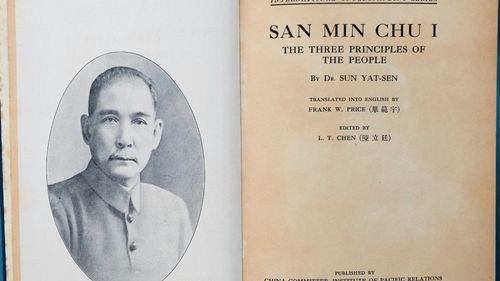How Nationalism Saves China - Sun-yat Sen
Dec 08, 2023 · 2 mins read
0
Share

Sun-yat Sen’s portrait is hoisted in Tiananmen Square each May Day and National Day, and two universities are named after him. In Taiwan, Sun’s portrait is on the walls of schools and on its banknotes.
Save
Share
Sun’s “Three Principles” – nationalism (Mínzú), democracy (Minquán), and people’s livelihood (Minshēng) - would be the “salvation of the nation”, ensuring China’s recognition as the equal of other nations, and bringing political stability and economic justice.
Save
Share
China had gone from being the hegemon of the East to being a mere sub-colony of other powers. To restore the nationalist spirit, propaganda was needed. This was the aim of Sun’s classic book, Three Principles of the People (1925).
Save
Share
Chinese people historically had pride in the family or clan, less so in China as a nation. Yet Sun argues that China the legal entity and race of people are the same: 10 million Mongols, Manchus, Tibetans, and Tartars,were nothing next to 400 million ethnic Han Chinese.
Save
Share
If China were not united as one nation, and if Japan continued its rate of population growth, it could take over China. Sun creates a sense of crisis that it is under threat of racial extermination by white Western nations and Japan, and also political and economic extinction.
Save
Share
In military terms, Japan could overrun China in 10 days. America in a month. With its strategic base of Hong Kong, it would take Britain only a couple of months. The only reason no power had take over China was that each was jealous of each other’s sphere of influence.
Save
Share
Banks and shipping were dominated by foreigners, particularly the Japanese, and taxes paid by Chinese people to foreign powers in the Concessions of Tianjin, Dairen, Hankou, Hong Kong and Formosa amounted to hundreds of millions of dollars a year.
Save
Share
He calls for protective tariffs against imported Western goods, particularly fabrics, which were decimating the mills and weavers in the Chinese countryside. In this he is inspired by Gandhi’s Indian rebellion against the British imperialists.
Save
Share
Sun has nothing against cosmopolitanism and globalization (after all, he had greatly benefited from his wider world view and travels), but asserts that it must only happen after China has become self-determining.
Save
Share
Nations prosper when they have a sense of crisis, when they feel under threat. This is exactly what was lacking in modern China, Sun-yat Sen felt. Slowly the Chinese had forgotten their great past and allowed other nations to take to chip away at it and take the best bits.
Save
Share
0